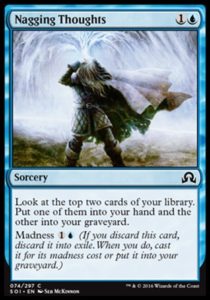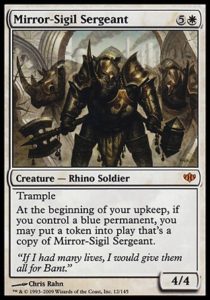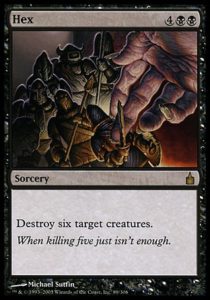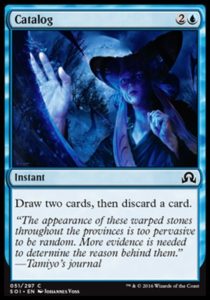Welcome back! Last time, we delved into the question of just what Magic is. This week, we’ll go deeper and start looking at some potential answers.
Review from Last Time
We left off defining Magic as a synthesis of its rules and its physical components: if you’re playing with Magic cards and according to the Magic Comprehensive Rules, you’re probably playing Magic.
Proxy cards, token cards, and the Domain Game call this definition into question.
- Proxy cards aren’t legal in tournaments, but enable people to play Magic without having the proper cards (undermining the need for actual Magic cards).
- Tokens are semi-official game pieces, but serve as proxies for things that aren’t cards. This muddies our definition—if they are Magic, what are they?
- The Domain Game involves a large bending of the rules, but so did Elder Dragon Highlander before it become the sanctioned format, Commander. If the Domain Game isn’t Magic, then we’ve crossed an invisible line (the boundary between Magic and not-Magic) somewhere when we bent the rules. Regardless of whether the Domain Game is or is not Magic, we want to know more about this invisible line that separates Magic from all other games and activities.

Further Considerations
Before we start answering the questions already posed, there are several more that have come to mind. I’ll go over these quickly, so we have some time for answers.
- Ante. Is it Magic if people are playing with ante? Or is that an early, prototyptical form of Magic so divorced from contemporary Magic that it’s something else? If ante has no place in current Magic, does that mean that Contract From Below isn’t a Magic card?
- Custom cards. Are custom cards Magic? They look far more like Magic cards than proxy cards or even tokens do. But they’re not official and don’t refer to actual cards. Are they Magic, or are they something similar, but different? On a related note, are people who are playing with proxied, leaked cards playing Magic? They’re not using official Magic cards.
- Unique cards. Are Proposal, Shichifukujin Dragon, and 1996 World Champion Magic cards? Are they non-game collector’s items? They’re weird because they’re unique (the dragon and champion only have one copy in existence, and the champion is embedded in a trophy) and not legal in any format.
- Unintended Stuff. Is Luis Scott-Vargas breaking Magic Online with three Oblivion Rings Magic? Is it the game breaking down? Perhaps it’s the Magic equivalent of speedrunning—it’s possible, but not at all intended by the designers.
- Pregame. Are people playing when they’re drafting, or are they performing a non-game or pre-game activity that will enable later play? Are they playing an entirely separate game?
- Midgame. Is sideboarding playing? Are people playing when they’re shuffling their decks? When they’re mulliganing? When they’re waiting for their opponent to act?
- Metagame. Are people playing Magic when they’re building decks? When they’re trading or speculating?

Is Magic One Game or Several?
We’ve taken for granted that Magic is a game, and we’re not questioning that assumption. We’ve repeatedly questioned whether Magic is one game or multiple games. We’ve also considered whether parts of Magic, such as drafting or deckbuilding, are part of the game of Magic or are Magic-related, non-game activities (they aren’t games, but they do relate to a game, a distinction I won’t go too much further into at present—to do so involves a definition of what games are, something we’ll get to next time). It could be the case that Magic is one game, but with many non-game portions; it could also be the case that Magic is an enormous game, with hundreds of ways to play and more possible decks than there are atoms in the universe; or perhaps Magic is an umbrella or category which applies to a multitude of separate, but closely related games.
Let’s start this question with an example. Consider this: you and a new friend discover you both enjoy Magic. You excitedly agree to meet and play. In your haste, neither of you has consulted the other about what cards to bring. You arrive with your Roon of the Hidden Realm Commander deck and see that your opponent is goldfishing with their Modern Merfolk deck. Neither one of you is ‘wrong’ about what you brought; you both brought Magic decks, but you’ll have a hard time playing against each other. Your decks are designed to do two very different things in two very different formats (they might not even be legal—the Modern deck is most likely 40 cards short of being a legal Commander deck).
The default meaning of Magic is different between the two of you: when you think of Magic (well, the hypothetical you in this example), you think of Commander, but your friend thinks first of Modern. This is a difference of opinion and taste; there’s not a ‘more correct’ way to play Magic. If one of you had shown up with a Standard deck, you’d have brought a deck from a more popular format, but it being more popular doesn’t mean you brought a deck that’s ‘more Magic’ than your opponent’s Modern deck (and if that were the case, then whoever brought a casual kitchen table deck would have the most popular, and most-Magic deck there is). There’s no one, true way to play Magic any more than there is a correct way to play Poker, or a best board game.

No Way to Play is more Right than Any Other?
This line of thinking suggests that Magic is an umbrella for several games, just as playing cards can be used for a wide variety of distinct games. Let’s contrast this with chess: suppose that you and your new friend instead agreed to a game of chess, but didn’t iron out the particulars. You show up intending to play a casual, relaxed game over an afternoon of conversation and snacks. Your friend arrives with clocks for speed chess. While neither of you is ‘wrong’ about how you intended to play, you are nevertheless able to play a game of chess with the same pieces and the same rules (you’ll just need to agree on how competitive and fastidiously timed you’ll be).
If you had both arrived with Standard legal decks, but one of you wanted to enforce Competitive REL to prepare for a tournament and the other to play more relaxed matches, you’d be able to sit down and play with each other (whereas in the Modern/Commander example, you wouldn’t be able to). This makes Modern, Commander, and Standard seem to be distinct games, and if they are, then Magic is a broad class of games, not a singular game. If that’s the case, it makes a good amount of sense: people engage with the game in drastically different ways, ways that are substantially divorced from other peoples’ experiences. This is not merely a distinction between competitive and noncompetitive play, but a distinction that can prevent people from being capable of playing Magic against each other.
On the other hand, there’s nothing stopping you from playing Commander against a Modern deck, or a Standard deck against a Lorwyn preconstructed deck. You’re able to play against any sort of deck (even if it’s likely to consistently go badly for one player). This discourages the umbrella theory and pushes Magic back towards being one game. So… we’ve not proved anything yet. Magic could be one game or several.
I’m eager to get to the end of this winding path, but I’m calling it here for this week. If you’re interested in this discussion, feel free to comment below. Do you think Magic is one game or several? Do you find this line of inquiry interesting, useless, pointless? I’m happy to hear all of your thoughts.
And as always, thansk you reading.
—Zachary Barash
Zachary Barash has been playing Magic on and off since 1994. He loves Limited and drafts every available format (including several that aren’t entirely meant to be drafted). He’s a proud Cube owner, improviser, and game designer (currently going for an MFA in Game Design at NYU). He has an obsession with Indian food that borders on being unhealthy.


